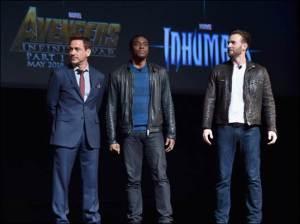Chris Evans and Robert Downey, Jr. stormed the stage of the El Capitan Theatre in Hollywood on October 28, 2014 as conquering kings. In front of 600 fans and assorted journalists, Kevin Feige had just blown everyone's mind by revealing Marvel's release slate through 2019, announcing solo films for Black Panther and Captain Marvel as well as the spoilery subtitles of the next Captain America, Avengers and Thor sequels. This was when the world officially first heard about Captain America: Civil War, and that it would co-star Iron Man as well as feature the debut of the newly cast Chadwick Boseman as Black Panther.
Evans and Downey, Jr. emerging from the shadows and joining Feige on stage was the exclamation point on the end of an amazing day. Boseman eventually joined them on stage, and at the end Evans and Downey, Jr. posed like boxers at the end of a weigh-in, previewing the Cap-Iron Man fight to come.
 Little did we know at that very moment a real civil war was breaking out behind the scenes at Marvel Studios. Well, not a "real civil war." It's not like people were killing each other, and families were being torn apart. One of the combatants is thought to carry a handgun with him at all times, though, and, oddly, that's the guy who lost this particular war.
Little did we know at that very moment a real civil war was breaking out behind the scenes at Marvel Studios. Well, not a "real civil war." It's not like people were killing each other, and families were being torn apart. One of the combatants is thought to carry a handgun with him at all times, though, and, oddly, that's the guy who lost this particular war.
Captain America vs. Iron Man? Fine, but the real fight was Ike Perlmutter (i.e., the gun-toting former Israeli soldier turned billionaire turned aggressively frugal Marvel CEO) vs. Kevin Feige (Marvel Studios' President of Production). Not that we knew they were fighting, not until August 31, 2015 when The Hollywood Reporter exclusively broke the news:
After what one source describes as "several years of frustration," Marvel Studios president Kevin Feige has pulled off a reorganization of the vaunted film company that has him reporting to Disney studio chief Alan Horn as opposed to the infamously micromanaging Marvel Entertainment CEO Isaac "Ike" Perlmutter [...] Jeph Loeb, head of Marvel Television, continues to report to Perlmutter, who will maintain oversight of Marvel's TV group, publishing, animation and other New York-based operations.
"Several years of frustration" is probably underselling it, based on how poorly Perlmutter comes off in insider reports, like this one from Bleeding Cool in 2012 and THR's notorious 2014 profile. Long story short, spending money seems to cause him physical pain, and one can only image how he managed to survive after agreeing to pay Robert Downey, Jr. $50 million for The Avengers, $75 million for Iron Man 3 and somewhere in the same ballpark for Age of Ultron and any future Avengers movie appearances.

Turns out, agreeing to a payday for Downey, Jr. in Civil War might have been the last straw for Feige and Perlmutter.
Check out the following excerpt from Kim Masters', of KCRW's The Business, recent conversation with Civil War directors Joe and Anthony Russo, picking up from the moment Anthony explained what happened once they decided they wanted to do the Civil War storyline:
Anthony: Once we had sort of pitched Kevin [Feige] why we really wanted to do Civil War and what we would do with the Iron Man character in Civil War and Kevin bought it, he said, "All right, guys, now you got to go get Downey. Good Luck." So he was very supportive of the idea, but it was a complicated proposition for Kevin because Downey changes the financial equation of the movie. This was a Captain America movie, and all of a sudden you're going to bring in Robert Downey into the budget level of a Captain America movie. It wasn't necessarily an easy road for Kevin, but he was hooked by on a creative level. I think he thought if we can hook him creatively, meaning Downey, then they're might be a road for him to figure it out financially.
Kim Masters: Why was Kevin saying, "Now you got to go get him"?
Joe: Well, because, one, you have to convince Downey on a creative level because he wasn't contracted to be in the film. It was outside of his contract. Two, we are working on a movie called Captain America. It is not the Avengers brand, which is a much more lucrative brand in the marketplace. So we had to go convince the powers that be that it was worth increasing the budget exponentially.
Kim: Isn't Kevin the power that is?
Joe: At the time...
Anthony: Don't you know? Everybody has a boss.
Kim: Oh, there was Ike. I wanted to ask you did life change because Ike Perlmutter obviously who was at the time running Marvel and still runs Marvel except for Kevin Feige got out under from reporting to him.
Joe: We'd been on that journey from Winter Soldier to Civil War, and it may have even been some story points in Civil War that caused the civil war within Marvel.
Kim: Oh, that's intriguing.
Joe: Without getting into too much detail, I think there were gears where Kevin was absorbing a lot of the pain inflicted on the company.
Kim: Because Ike Perlmutter, just to be perfectly clear, really, really does not like to spend money.
Joe: And I think there are some misconceptions in the marketplace about who Kevin is because he was representing everybody in the process.
Kim: Oh, like Kevin got blamed for Ike. Got it. I'll say the words.
Joe: And you're seeing some really compelling choices made on the directing front both on the new Thor film and [Ryan] Coogler on [Black] Panther, and I think the environment there is a much healthier, happier environment.
Kim: In other words, when you have a guy like Ryan Coogler they will spring for him.
Joe: I think, without question, and they're interested in some of the more compelling voices out there.
Joe and Anthony don't definitely state what exactly about Civil War caused the civil war at the company. By referring to "story points" they could also be saying something as simple as leaving Black Widow's ending in the film open-ended and thus setting her up for an on-the-run solo film (not that Marvel has actually dated a Black Widow movie yet, despite being committed to the idea now) could have been a point of contention. However, the real last straw might have actually been the battle to get Iron Man in Civil War.
Check out this Variety report from mid-October 2014, at which point Downey, Jr. was still negotiating with Marvel to be in Civil War:
Originally, Marvel wanted to hire Downey for a small role, which would have required just three weeks of work. But Downey wanted Stark to have a more substantial role in the film's plot, which would give him more screen time and naturally a bigger payday. This angered Marvel Entertainment chief Ike Perlmutter, who ordered the screenwriters to write Iron Man out of the script entirely, sources said.
Even though the deal appeared dead, Marvel Studios president Kevin Feige and Downey's reps at CAA continued talks in hopes of working out their issues. Feige was bent on executing his grand vision for extending the life of the Marvel characters over many years.
The executive needed his boss to see the big picture, considering the introduction of the Civil War story is seen as a way to drive the plots of sequels and new franchises for the next seven years, given the dramatic possibilities it offers for future films. The fallout from the government and Stark's actions would factor into a new "Avengers 4" film and beyond that will assemble new characters being introduced like Ant-Man, among others, in their own movies.
Downey ultimately secured the co-lead role he wanted, and his contract is said to be "$40 million plus backend participation" plus extra backend if Civil War becomes the highest-grossing Captain America movie (it will).
That's an insane (!) amount of money, but now imagine Civil War without Iron Man. It wouldn't be the same movie, and the MCU wouldn't be so perfectly set up with so many captivating cliffhangers. Getting Ike to pay Downey sounds like the type of battle Feige must have fought time and time again. Eventually, things had to change.

